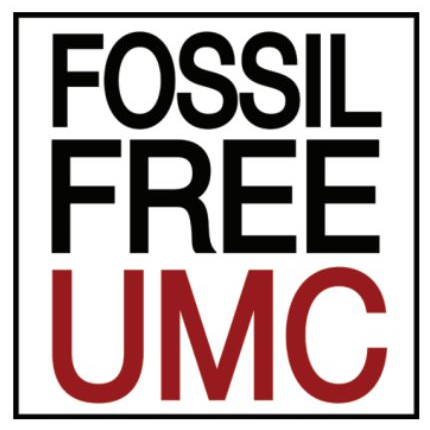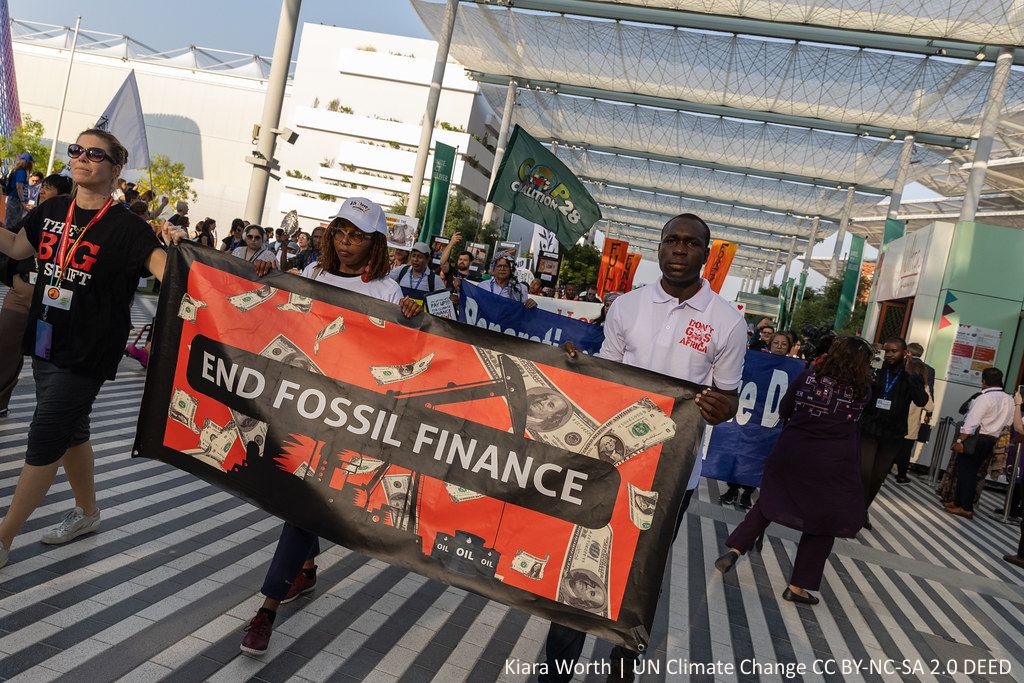Read this also at United Methodist Insight.
“My kingdom is not of this world.” John 18:36 (NIV)
What was the outcome of COP28? What light can our faith shed on these and other efforts to alleviate climate change and support climate justice? Finally, how does the mission of Fossil Free UMC to divest from fossil fuels further these efforts?
The 28th Conference of the Parties was held at the beginning of Advent this year, the hottest year ever recorded, a year when climate change fueled disasters on every continent. United Methodists were there, as at every international climate conference, speaking for strong climate action and for climate justice, in solidarity with those who are impacted first and worst by climate change.
Before I mention the outcome of COP28, let’s consider these words of Jesus: “My kingdom is not of this world.” This has been understood in different ways: as a purely spiritual “kingdom” experienced individually, or as an “upside-down kingdom” like in the sermon on the mount or in Mary’s Magnificat,” or as a “kin-dom” where other species and all parts of creation are included. When Jesus teaches his followers to pray, “Thy kingdom come, thy will be done, on earth as it is in heaven,” it implies that the world as it is now is not yet the world as God intends for it to be. United Methodists understand this when we speak of our mission to “make disciples of Jesus Christ for the transformation of the world.”
When Jesus says, “My kingdom is not of this world,” he is contrasting it with the kingdom of Herod or the Empire of Caesar. Walter Wink makes the case that when Jesus says “world” here, he does not mean God’s creation, but the “system,” that is, the human-constructed value-systems and structures in which we live—the “domination system.” Marcus Borg calls this “the normalcy of civilization.” Some people call it the “real world.” In other words, Jesus is pointing out two opposing paradigms: the world as it is now and the world as God intends for it to be.
If Fossil Free UMC’s petition to add fossil fuels to our list of ethical investment screens passes at General Conference, it would contribute to systemic change by removing the moral endorsement of fossil fuels that we provide through our current investment practices.
Rev. Sharon Delgado
These conflicting paradigms are still at work today. We see the dominant system everywhere: news of domination and violence, human social organization forced to conform to the Market, extraction and destruction of ecosystems, and racial, ethnic, gender, class, and other hierarchies based on who is at the top of today’s corporate-dominated global system. Yet faith enables us to also glimpse a new order, an alternative to the dominant system and its values, based instead on the compassion, justice, inclusivity, and nonviolence that characterized Jesus’s life and on care and concern for all creation.
This is relevant for our understanding of today’s ongoing struggle to address climate change in meaningful ways. A look at COP28 helps us see the limitations of the dominant system. It was held in the United Arab Emirates (UAE), which relies on the production of fossil fuels. UAE president, Sheikh Mohamed bin Zayed Al Nahyan, is also head of the country’s national oil company. Over 2,400 fossil fuel industry lobbyists attended COP28, more than most national delegations and more than the delegations of the ten most climate-vulnerable nations combined.
Nevertheless, despite the outsized influence of wealthy nations, fossil fuel interests, and true believers in the dominant system (which is burning up our planet), another paradigm was also apparent at the talks and beyond. The global climate justice movement, aligned with nations most vulnerable to climate change, pushed for a “phaseout” of fossil fuels and for government contributions to the loss and damage fund for countries harmed most by climate change.
Because of this pressure, the final agreement did include a disappointingly elastic “transition away from fossil fuels” (instead of a phaseout) and contributions to the loss and damage fund of $700 million, a paltry sum compared to the $400 billion estimated costs of loss and damage in developing countries today. Some count these developments as progress, since the words “fossil fuels” were finally included in a climate agreement for the first time, and since the loss and damage fund agreed to last year at COP27 (after a 30-year struggle) was finally funded this year. Many climate justice proponents were appalled by the affirmation of “transitional fuels” in the final document, which refers to highly polluting methane gas. In other words, it’s slow going when the key decision-makers are working within the dominant system and are unable to see another way.
But there is another paradigm at work. The movement for climate justice is growing stronger and will not quit. Its goal is “system change not climate change.” Fossil fuel divestment, which is part of its strategy to bring about systemic change, is advancing.
In its article, Movement Milestone, Stand.earth announced: “On the heels of COP28, where world governments finally recognized the need to “transition away from fossil fuels” but failed to acknowledge the inevitable phase-out, the global fossil fuel divestment movement surpassed a major milestone… leading the way to a fossil free world: 1600+ institutions, representing $40.6 trillion in assets, are cutting ties with the toxic energy of the past…[This] is a phenomenal milestone and win for the movement.”
Martin Khor of the Third World Network speaks about the two conflicting paradigms at work in our world, but from a secular perspective. He describes the first as the top-down system of corporate globalization backed by violence, and the second as an emerging alternative system that is community based, people friendly, earth centered, and nonviolent. He points out that because we live within the dominant system, we must also work within it to make it fairer, more just, and less ecologically destructive. That is what climate justice activists, including United Methodists, are doing at climate conferences. But, says Khor, we must also “nurture seeds of hope to bring alive the second paradigm and infuse it into the first paradigm as a kind of transition.”
Institutional divestment from fossil fuels is a strategy that infuses the second paradigm into the first as a kind of transition. It is a way to collectively relinquish the profits of the fossil fuel based global economy. If Fossil Free UMC’s petition to add fossil fuels to our list of ethical investment screens passes at General Conference, it would contribute to systemic change by removing the moral endorsement of fossil fuels that we provide through our current investment practices.
Withdrawing our financial investments from fossil fuel corporations makes clear that we are willing not simply to “transition away from fossil fuels,” but to “phase out fossil fuels” as quickly as possible while protecting people’s rights, livelihoods, and ecosystems, because #LaterIsTooLate. This strategy recalls Jesus’s proclamation of “the kingdom of God” and its contemporary secular counterpart that proclaims that “another world is possible.”
For more updates on COP28 from a faith perspective, read PastorRichenda’s COP28 Wrap Up at Just Creation.
Photo credit, featured photo: Members of Don’t Gas Africa march in Dubai during COP28. Photo by Kiara Worth | UN Climate Change CC BY-NC-SA 2.0 DEED
Sharon Delgado is a retired UM Elder, Chair of the Cal-Nevada Climate Justice Ministries Task Force, member of the Coordinating Committee of the UM Creation Justice Movement, and Convener of Fossil Free UMC. She is author of The Cross in the Midst of Creation, Love in a Time of Climate Change, and Shaking the Gates of Hell. She blogs at sharondelgado.org.


2 responses to “A Fossil Free UMC Response to COP28: The Limitations of the Dominant Paradigm for Climate Rescue”
[…] change not climate change.” For more on this topic, read A Fossil Free UMC Response to COP 28: The Limitations of the Dominant Paradigm for Climate Rescue by Sharon […]
LikeLike
[…] of dispossession and inequality that have divided the world between rich and poor. (See also: The Limitations of the Dominant Paradigm for Climate Rescue, Sharon Delgado, Dec. 19, 2023, Fossil Free […]
LikeLike